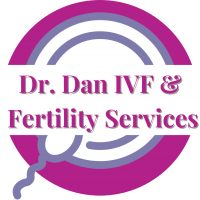There are a million factors that go into a successful conception and pregnancy, including a viable egg, healthy sperm, and a womb capable of carrying a baby to term. For some clients, infertility issues make it impossible for them to have a natural conception. In addition, same-sex couples and single intended parents only have about half of the pieces of the puzzle. Fortunately, there are many options to fill in the rest of the pieces and fulfill every family’s dream. When other people are involved in providing eggs, sperm, or a surrogate pregnancy, it’s called third party reproduction. Dr. Dan can help you determine if third party reproduction is right for you, and will be with you every step of the way.
EGG DONATION
Egg donation is the most common form of third-party reproduction. Whether from age or medical conditions, some women’s eggs are unable to produce a successful pregnancy. In these cases, eggs from a thoroughly vetted egg donor allow the client to carry and deliver a baby.
The first step is comprehensive diagnostic testing to explore all your fertility options and determine if egg donation is right for you. The next step is choosing an egg donor. Our donor database is filled with qualified donors from diverse backgrounds with comprehensive information on their health history, family history, education, and life story, so you can make the most informed decision. Dr. Dan and our staff are here to answer any and all questions to help you understand the process and feel at ease.
Once you have found your perfect egg donor, the actual donation process begins. As with all infertility treatments, there are a lot of details that can feel overwhelming. We’ve outlined the steps below, but rest assured Dr. Dan will go over the whole process with you, making sure you are confident, comfortable, and informed.
THE EGG DONATION PROCESS
There are six main steps involved in egg donation:
Evaluation Cycle
Medication/Egg Donor Preparation
Egg Retrieval/Sperm Sample
In Vitro Fertilization (IVF)
Embryo Transfer
Pregnancy Testing
During the evaluation cycle, you will take estrogen and be monitored with blood tests and ultrasound to observe how your uterine lining develops. This is basically a test to see what levels of hormones are needed to successfully prepare for the embryo transfer. This cycle usually takes four to six weeks.
Once the evaluation cycle is complete, you and your egg donor will start the donation cycle. You will take estrogen, while your donor will essentially go through the first half of the IVF process to develop and retrieve her eggs. On the day of egg retrieval, your partner (or the sperm donor) will provide a sperm sample. The donor egg and sperm are combined through IVF to fertilize the eggs. Less than a week after the IVF, the newly formed embryos will be transferred to your uterus through an in-office procedure. After the transfer, our team will administer pregnancy tests and other monitoring as needed to care for your developing pregnancy.
SPERM DONATION
Sperm donation is a great option for cases of male factor infertility where the sperm is unable to fertilize healthy eggs, or for individuals or couples where neither partner produces sperm. Dr. Dan works with exclusive cryobanks that provide extensive information on the sperm donors’ background and history. The donated sperm samples can be used to fertilize eggs through intrauterine insemination (IUI), or through IVF as needed. Dr. Dan will discuss all the options with you to decide which is the best choice.
GESTATIONAL SURROGACY
Gestational surrogacy, IVF surrogacy, or surrogate pregnancy is where a surrogate agrees to carry a pregnancy for a couple that cannot carry their baby themselves. This could be because of health conditions that prevent an individual from carrying the baby in their uterus, for single male parents, or for same-sex or transgender couples where neither partner has a uterus. The embryo carried by the gestational surrogate can come from your and your partner’s eggs and sperm, or from donor eggs and/or donor sperm, depending on the situation.
If the embryo is coming from you and your partner, then you will go through almost all of the IVF process to develop, retrieve, and fertilize the eggs. Once the embryos have developed, they will be screened for genetic conditions, and the healthiest and most viable embryos will be transferred to your surrogate. The surrogate carries the pregnancy and delivers your healthy, happy baby.
Our surrogate partner program will help you through the whole process, from choosing a surrogate to completing the required paperwork and legal documents. California is a surrogacy-friendly state, and IVF surrogacy is a beautiful way to grow your family.
